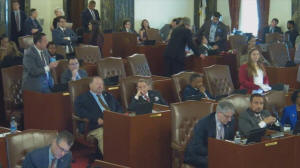|
Senate Bill 1769 would require state government entities to
purchase or alter their vehicles into zero-emission vehicles by
2030.
State Sen. Rachel Ventura, D-Joliet, said her measure is in an
effort to lower the state's emissions.
The measure led to pushback from Republican lawmakers in the
Senate. State Sen. Andrew Chesney, R-Freeport, asked about how
the state would be able to charge these vehicles and how
reliable they would be.
"It doesn't concern you right now that a charge is about 60 to
120 miles. I believe there are one or two charging stations in
Springfield alone, and that's all," Chesney said.
State Sen. Terri Bryant, R-Murphysboro, made a similar argument
against the bill claiming those in rural Illinois would have a
challenging time implementing this measure and that it could
have an impact on correctional services.
"Not only do we not have the ability to charge them, the
batteries will not allow you in the more rural areas to drive
that far, which, low and behold, is where the state facilities
are located when it comes to correctional facilities," Bryant
said. "This is not a good bill."
Ventura responded by saying that the state is moving towards
this change and that owning and operating these vehicles would
be easier in the future.
"Our state has moved aggressively towards bringing dollars into
[electric vehicle] charging stations. There are current grants
out there today. The federal government has also put dollars
into the [Infrastructure Investment and Jobs Act] grants that
are coming down specifically to expand the electric chargers
across the United States and Illinois," Ventura said.
The measure passed the Senate and will now be sent to the House
for further action.
Lawmakers adjourn the spring session on May 19.
Andrew Hensel reports on issues in Chicago and
Statewide. He has been with The Center Square News since April
of 2021 and was previously with The Joliet Slammers.

|
|



